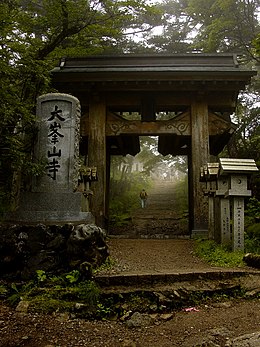Ōminesan-ji
| Ōminesan-ji 大峯山寺 | |
|---|---|
 Stairs on the way to Ōminesan-ji | |
| Religion | |
| Affiliation | Shugendō |
| Deity | |
| Location | |
| Location | Ōmine-san, Tenkawa-mura Yoshino-gun, Nara Prefecture |
| Country | Japan |
| Geographic coordinates | 34°15′11″N 135°56′29″E / 34.2530°N 135.9414°ECoordinates: 34°15′11″N 135°56′29″E / 34.2530°N 135.9414°E |
| Architecture | |
| Founder | En no Ozunu |
| Completed | Second half of 7th century |
Ōminesan-ji (大峯山寺, Ōminesan-ji) is an important temple of the Shugendō religion in Yoshino district, Nara prefecture, Japan. It is located at the peak of Mount Ōmine, or Sanjōgatake. According to tradition, it was founded by En no Ozunu, the founder of Shugendō, a form of mountain asceticism drawing from Buddhist and Shinto beliefs. Along with Kinpusen-ji Temple, it is considered the most important temple in Shugendō.[1]
The sanctuary around the Sanjōgatake peak (山上ヶ岳) has long been considered sacred in Shugendō,[2] and women are not allowed in the area[3][4] beyond four "gates" on the route to the peak.[5] On the neighboring Inamuragatake peak (稲村ヶ岳), altitude 1,726 m, it has been opened as a place of training for female believers since 1959, thus called "Women's Ōmine" (女人大峯, Nyonin Ōmine).
In 2004, Ōminesan-ji was designated as part of a UNESCO World Heritage Site under the name Sacred Sites and Pilgrimage Routes in the Kii Mountain Range.
See also[]
Notes and references[]
- ^ "About World Heritage Site Yoshino and Ōmine". Sacred Sites and Pilgrimage Routes in the Kii Mountain Range. Retrieved 2 February 2021.
- ^ Fujiwara no Michinaga offered sutras in a gilt bronze container in Heian period buried in a mound near the mountain top, which was excavated and designated a National Treasure in August 11, 2007.
- ^ Kaneko, Juri. "Nyonin kinsei no "dentō" to honshitsu" [The term "tradition" and essence of denying women] (PDF). Gendai shūkyō to josei [Modern religion and women] (in Japanese). Tenri University (9). Retrieved 10 October 2017.
- ^ Rurubu, ed. (2004). Nihon hyakumeizan yamāruki gaido [100 Famous Mountains in Japan—Mountaineering Guide]. Otona no ensoku bukku (in Japanese). 2. JTB. ISBN 9784533052279. OCLC 169911259. Retrieved 10 October 2017.
- ^ "Ōmine, nyonin kekkai—nyonin kinsei no yama yottsu no mon (4)" [Four gates on a "No woman admitted" mountain; Ōmine, barriers against women (4)] (in Japanese). 25 April 2009. Retrieved 10 October 2017.
External links[]
| Wikimedia Commons has media related to Ōminesan-ji. |
- Sacred places and pilgrimage roads in Kii mountains –Yoshino, Ōmine area (in Japanese)
- Ōmine Okugake Training (in Japanese)
- Buddhist temples in Nara Prefecture
- World Heritage Sites in Japan
- Important Cultural Properties of Japan
- Historic Sites of Japan
- Shugendō
- Japanese religious building and structure stubs
- Buddhist temple stubs

